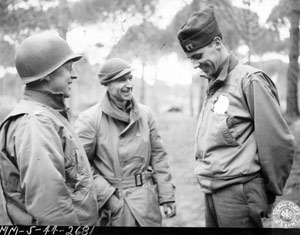Pyle marveled at the men who fixed things that were broken.
SOMEWHERE IN NORMANDY, July 26, 1944 – Let’s go to what the ordnance branch calls one of its "mobile maintenance companies."
This type company repairs jeeps, light trucks, small arms and light artillery. It does not take tanks, heavy trucks or big guns.
The company is bivouacked around the hedgerows of a large, grassy, L-shaped pasture. There are no trees in the pasture. There is nothing in the center except some grazing horses. No man or vehicle walks or drives across the pasture. Always they stick to the tree-high hedgerows.
It is hard to conceive that here in the thin, invisible line around the edges of this empty pasture there is a great machine shop with nearly two hundred men working with wrenches and welding torches, that six teams of auto mechanics are busy, that the buzz of urgent labor goes on through all the daylight hours.
Actually there is little need for such perfect camouflage for this company is perhaps ten miles behind the lines, and German planes never appear in the daytime. But it’s a good policy to keep in practice on camouflage.
*
This is a proud company. It was the first one to land in France – first, that is, behind the companies actually attached to divisions. It landed on D-day plus two and lost three men killed and seven wounded when a shell hit their ship as they were unloading.
For five days it was the only ordnance company of its type ashore. Its small complement, whose job in theory is to back up only one division in medium repair work, carried all repair work for four divisions until help arrived.
The company had a proud record in the last war, being in nine major engagements. And it has a sentimental little coincidence in its history, too. In 1917 and in 1943 it left America for France on the same date, December 12.
*
In one corner of the pasture is the command post tent where two sergeants and two officers work at folding tables and keep the records so necessary in ordnance.
A first lieutenant is in command of the company, assisted by five other lieutenants. Their standby is Warrant Officer Ernest Pike of Savoy, Texas, who has been in the Army fifteen years, thirteen of them with this very company. What he doesn’t know about practical ordnance you could put in a dead German’s eye.
In another corner of the pasture is a mess truck with its field kitchens under some trees. Here the men of the company line up for meals with mess kits, officers as well as men, and eat sitting on the grass.
The officers lounge on the grass in a little group apart and when they finish eating they light cigarets and play awhile with some cute little French puppies they found in German strong points, or traded soap and cigarets for. The officers know the men intimately and if they are in a hurry and have left their mess kits behind, they just borrow one from some soldier who has finished eating.
*
A company of this kind is highly mobile. It can pack up and be underway in probably less than an hour.
Yet ordnance figures as a basic policy that its companies must not move oftener than every six days if they are to work successfully. They figure one day for moving, one for settling down and four days of full-time work, then move forward again.
If at any time the fighting army ahead of them gets rolling faster than this rate, the ordnance companies begin leapfrogging each other, one working while another of the same type moves around it and sets up.
Their equipment is moved in trucks and trailers. Some trucks are machine shops, others are supply stores. Some plain trucks are for hauling miscellaneous stuff.
Once set up, the men sleep on the ground in pup tents along the hedge with foxholes dug deep and handy. But usually their greatest enemy is the hordes of mosquitoes that infest the hedgerows at night.
The more skilled men work at their benches and instruments inside the shop trucks. The bulk of the work outside is done under dark-green canvas canopies stretched outward from the hedgerows and held taut on upright poles, their walls formed of camouflage nets.
Nothing but a vague blur is visible from a couple of hundred yards away. You have to make a long tour clear around the big pasture, nosing in under the hedge and camouflage nets to realize anything is going on at all.
In the far distance you can hear a faint rumble of big guns, and overhead all day our own planes roar comfortingly.
But outside those fringes of war it is as peaceful in this Normandy field as it would be in a pasture in Ohio. Why, even the three liberated horses graze contentedly on the ankle-high grass, quite indifferent to the fact that this peaceful field is a part of the great war machine that will destroy their recent masters.



